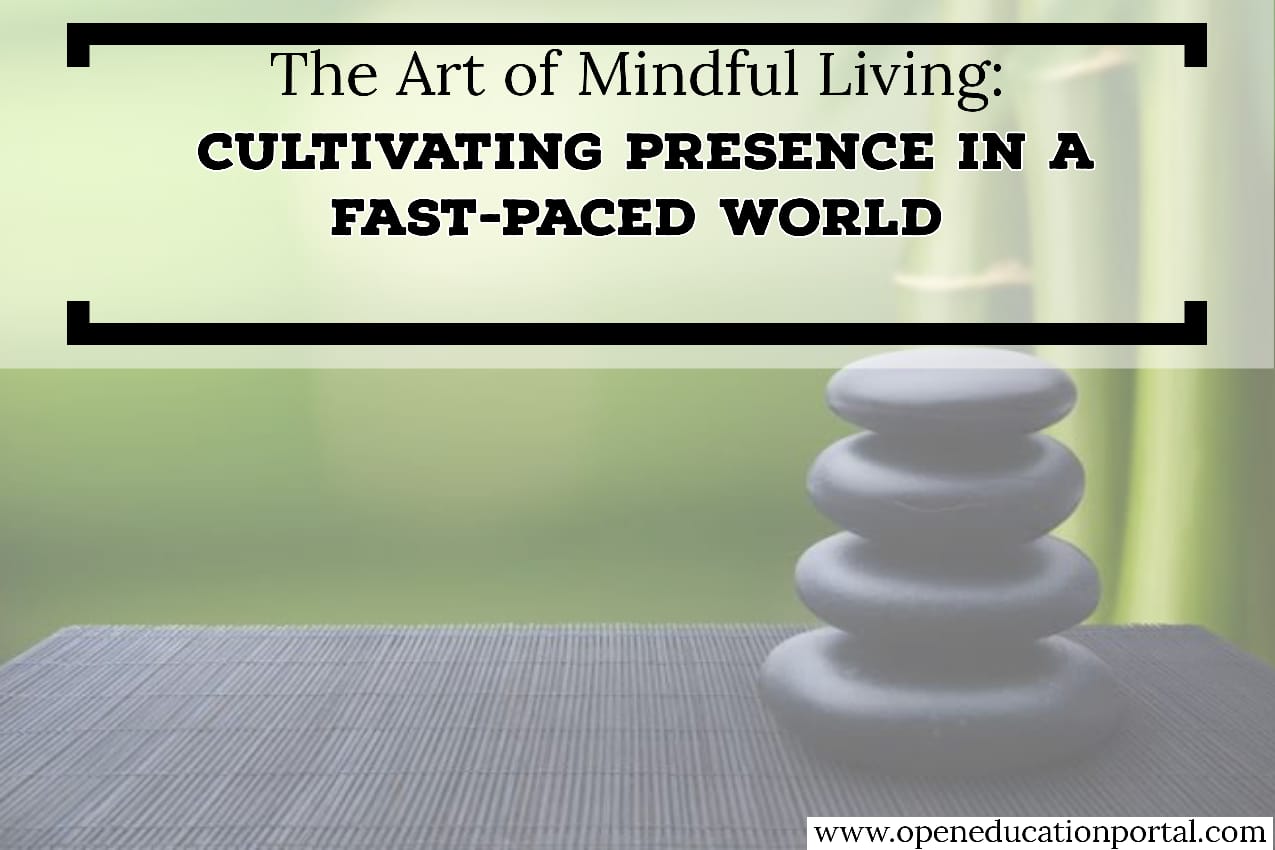Embark on a journey into the realm of Mindful living techniques from the East, where ancient wisdom meets modern practices. This captivating introduction sets the stage for a deep dive into mindfulness, meditation, and more, drawing readers in with its intriguing blend of tradition and innovation.
As we unravel the essence of mindful living in Eastern philosophies, a world of tranquility and self-discovery unfolds before us, offering invaluable insights and practical tools for enhancing our daily lives.
Introduction to Mindful Living Techniques from the East

Mindful living in Eastern philosophies refers to the practice of being fully present in the moment, cultivating awareness of one's thoughts, feelings, and surroundings without judgment. It involves paying attention to the present moment with openness, curiosity, and acceptance.
Incorporating mindfulness into daily life is significant as it can help reduce stress, improve mental clarity, enhance emotional well-being, and promote overall health and happiness. By practicing mindfulness, individuals can develop a greater sense of self-awareness, compassion, and connection to others.
Cultural Roots and Historical Background
Mindful living techniques have deep cultural roots in Eastern philosophies such as Buddhism, Taoism, and Hinduism. These practices have been passed down through generations and have been integrated into various aspects of daily life in many Eastern societies.
Historically, mindfulness has been used as a tool for spiritual growth, self-discovery, and enlightenment in ancient Eastern traditions. Today, these techniques are increasingly recognized in the Western world for their therapeutic benefits and are commonly used in mindfulness-based interventions for stress reduction and mental health.
Meditation Practices

Meditation is a fundamental aspect of mindful living in the East, with various techniques such as Zen, Vipassana, and Tai Chi being widely practiced. These practices not only differ in their methods but also offer unique benefits for mental health and overall well-being.
Zen Meditation
Zen meditation, also known as Zazen, focuses on mindfulness and awareness. Practitioners typically sit in a specific posture and concentrate on their breath or a particular mantra. The goal is to achieve a state of deep relaxation and heightened awareness of the present moment.
Vipassana Meditation
Vipassana meditation, originating from the Buddhist tradition, involves observing sensations in the body without reacting to them. This practice aims to cultivate insight into the nature of reality and develop a sense of equanimity towards both pleasant and unpleasant experiences.
Tai Chi Meditation
Tai Chi combines meditation with gentle physical movements, promoting relaxation, balance, and harmony. Practitioners focus on flowing movements, deep breathing, and a calm mind to enhance both physical and mental well-being.Regular practice of these meditation techniques from the East can lead to improved concentration, reduced stress, increased self-awareness, and a greater sense of inner peace.
By incorporating these practices into daily life, individuals can cultivate a deeper connection with themselves and the world around them.
Breathing Exercises
Breathing exercises play a crucial role in mindfulness practices, helping to calm the mind and increase awareness of the present moment. One of the most well-known breathing techniques is Pranayama from yoga traditions, which focuses on controlling the breath to achieve a sense of balance and relaxation.
Pranayama Breathing Exercise
Pranayama consists of various breathing techniques, each with its own unique benefits. One common practice is the 4-7-8 technique, which involves inhaling for 4 counts, holding the breath for 7 counts, and exhaling for 8 counts. This exercise helps to calm the nervous system and reduce stress levels.
Deep Breathing Importance
Deep breathing is essential in mindfulness practices as it helps to bring focus to the present moment and reduce anxiety. By taking slow, deep breaths, you can activate the body's relaxation response and promote a sense of calmness. To perform deep breathing, find a comfortable seated position, place one hand on your chest and the other on your abdomen, inhale deeply through your nose, feeling your abdomen rise, hold for a few seconds, and exhale slowly through your mouth, feeling your abdomen fall.
Repeat this process for several minutes to feel more relaxed and centered.
Mindful Eating Habits
Mindful eating is a practice rooted in Eastern traditions that focuses on being fully present and engaged while consuming food. It involves paying attention to the sensory experience of eating, such as the taste, texture, and smell of the food.
Benefits of Mindful Eating
Mindful eating has numerous benefits for both physical and mental well-being. Here are some key advantages:
- Improved digestion: Being present while eating can aid in better digestion and nutrient absorption.
- Weight management: By eating mindfully, individuals are more likely to recognize when they are full, preventing overeating.
- Enhanced satisfaction: Savoring each bite and being mindful of the eating process can lead to increased satisfaction and enjoyment of meals.
- Reduced stress: Mindful eating can help reduce stress levels by promoting a sense of calm and relaxation during meals.
Nature Connection

In Eastern mindfulness practices, nature plays a significant role in helping individuals connect with their surroundings and find inner peace. One popular practice that emphasizes this connection is forest bathing, which involves immersing oneself in nature and being present in the moment.
Forest Bathing and Calming Effects
Forest bathing, also known as shinrin-yoku in Japanese, has been shown to have calming effects on the mind and body. By spending time in nature, practicing mindfulness, and engaging the senses, individuals can reduce stress, anxiety, and increase overall well-being.
- Take a leisurely walk in a natural setting, focusing on the sights, sounds, and smells around you.
- Sit quietly under a tree or by a stream, and allow yourself to be fully present in the moment.
- Practice deep breathing exercises while surrounded by nature to enhance relaxation and mindfulness.
Mindful Nature Connection in Daily Life
Connecting with nature mindfully in daily life can be as simple as incorporating small practices into your routine that help you stay present and appreciate the natural world around you.
- Start your day by spending a few moments outside, breathing in the fresh air and feeling the sun on your face.
- Take breaks throughout the day to step outside and observe the beauty of nature, even if just for a few minutes.
- Practice gratitude for the natural elements around you, such as the trees, flowers, or animals that share your environment.
Mindful Movement Practices
Engaging in mindful movement practices such as Qigong and Tai Chi can greatly enhance your overall sense of mindfulness and well-being.
Qigong
Qigong is a gentle exercise practice that combines slow, flowing movements with deep breathing and meditation. It aims to cultivate and balance the body's vital energy, known as "qi" or "chi".
- Qigong promotes relaxation, reduces stress, and improves focus and concentration.
- Regular practice of Qigong can enhance flexibility, balance, and coordination.
- It fosters a deeper mind-body connection and helps in developing mindfulness in daily activities.
Tai Chi
Tai Chi is a martial art form that focuses on slow, deliberate movements and mindfulness. It emphasizes the integration of mind, body, and spirit.
- Tai Chi enhances strength, flexibility, and overall physical fitness.
- It promotes relaxation, reduces anxiety, and improves mood and emotional well-being.
- Regular practice of Tai Chi can improve posture, balance, and coordination.
Final Thoughts
In conclusion, the tapestry of Mindful living techniques from the East weaves together a tapestry of mindfulness, meditation, and mindful movement, empowering individuals to cultivate inner peace and holistic well-being. Take these ancient practices with you on your journey towards a more conscious and fulfilling existence.
Questions and Answers
What is the significance of mindfulness in Eastern philosophies?
Mindfulness in Eastern philosophies emphasizes the practice of being present in the moment, cultivating awareness, and fostering a deep connection with oneself and the world around us.
How can mindful eating habits benefit our health?
Mindful eating habits can promote healthier food choices, aid in digestion, prevent overeating, and enhance the overall dining experience by allowing us to fully appreciate and savor each bite.
What are some examples of mindful movement practices from the East?
Examples include Qigong, Tai Chi, and yoga, which focus on gentle, deliberate movements that promote mindfulness, balance, and harmony between the mind and body.












